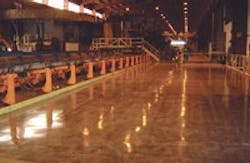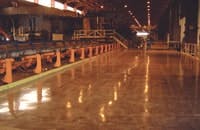Safe, environmentally friendly floor for steel forging facility
When Charter Steel, producer of more than a million tons of steel products per year, needed to renovate the concrete floors in its forging facility, a primary objective was safety. But the Cuyahoga, Ohio, steel mill also wanted an environmentally friendly floor. Charter Steel adheres to the ISO 14001 standard, which requires it to take a hard look at environmental effects. “You’ve got regulatory requirements you have to do, and then there are things that you like to do,” says Matt Schroeder, senior environmental engineer. “When we look at environmental projects, we obviously need to make them work from a cost standpoint. But sometimes you can use environmental benefits to help justify the cost.”
Facility Director Dave Light looked at various flooring products and chose DiamondQuest, a polished concrete flooring system from QuestMark Flooring (www.questmarkflooring.com). The process transformed Charter Steel’s existing concrete floor into a new floor with an impressive sheen that prevents contaminants from penetrating the surface, and did it without any environmentally harmful chemicals.
This environmentally friendly polished-concrete flooring system shines at inhibiting contaminants from penetrating the surface.
At Charter Steel, the concrete was prepared by grinding it with metal-bonded diamond tooling to remove buildups of glue, adhesive, paint and coatings. This step included patching and joint filling. Following the removal step, additional finer grinding prepared the floor for polishing by flattening and honing the concrete’s surface. Before polishing began, an application of liquid chemical densifiers ensured the concrete floor was hardened, able to repel liquids, and eliminate concrete dusting once the floor was complete. Finally, several finer resin-bonded diamond grinds produced the finished floor surface.
“Unlike other industrial floors we’ve [re]surfaced, the steel mill posed unique challenges that we had to solve,” says John Kasik, national sales manager, QuestMark. Patching the occasional hole or rough area is a standard part of concrete polishing, but at Charter Steel, the damage was extensive. Red-hot steel drops to the floor, expanding moisture in the concrete and causing it to pop up and form potholes. The uneven floor is an obvious safety concern for tripping hazards.
QuestMark repaired the damage by shotblasting the surface to clean the holes and rough areas. Then a clear polymer coating filled the holes and pitted areas. Because this was done in the early stages of polishing, residual material on the top of the floor was removed in the grinding process, leaving the holes and pitted areas filled.
The grinding process uses quiet HEPA vacuums to contain residue, ensuring that air quality is maintained and that dust isn’t released where it can damage equipment. The floor was accessible immediately after the process was finished because there was no curing period, and the work was done during hours convenient for Charter Steel.
“Our downtime was minimal,” Light says. “They worked totally around our schedule.”
The floor is easily maintained, he adds. Steel mills generate a lot of scale dust particles that are swept up twice a day with a ride-on sweeper-scrubber. “The sweeper-scrubbers make the floor look brand-new again,” Light says. “It brings the floor back up to the original shine and luster.”
The plant's floor surface is now more functional and safer for material-handling equipment because it’s flatter and smoother, with no bumps at construction joints. The National Floor Safety Institute (NFSI) has certified DiamondQuest to meet the slip coefficient of friction (SCOF) for safety.
“The benefit of DiamondQuest was how it repaired our floor without having to pour another floor on top of it,” Light says. “We have many visitors come here from all over the country to look at the mill, and one of the first things comment on is how clean it is. The floor is just really, really nice. It looks like am walking through a Home Depot.”

